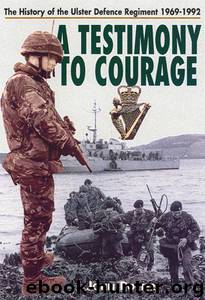Testimony to Courage: The History of the Ulster Defence Regiment 1969-1992 by John Potter

Author:John Potter
Language: eng
Format: epub
Tags: HISTORY / Military / Other
ISBN: 9781783379842
Publisher: Pen and Sword
Published: 2008-07-14T16:00:00+00:00
CHAPTER FOURTEEN
1980–1981 Tenth Anniversary
By the end of the 1970s the building of the Regiment had been completed. Now at the beginning of a new decade it was a matter of honing the professionalism of the battalions. Old soldiers, as old soldiers will, look back upon the first ten years as a time when life in their companies was ‘more fun’. It must seem a strange term to use of a decade in which ninety-nine serving and eighteen ex-members had been murdered. Battalions had been under intense pressure, success and tragedy had gone hand in hand. Yet there was a great sense of achievement for those who had served through the first ten years, a sense of having built out of nothing a force that was now able to take over the role of the Regular Army in a large part of the Province, a sense too of having helped to contain the violence of the IRA. The majority of men and women had had no previous service in the armed forces. They were, as they would have been the first to admit, amateur soldiers, able to stand back and find a quiet amusement in the traditional ways of the Regular Army, able to laugh at their own mistakes whilst determined to do better next time. There were more characters in their ranks and most of the light-hearted stories come from that first decade.
As the older men, many of them ex-B Specials, had begun to resign, the average age of the battalions decreased. By March 1981 the average in 3UDR was 31, the average length of service 5 years.
A change of emphasis had been adopted in recruiting advertising – the attraction of good wages rather than a call to serve one’s country, using, among others, the slogan “Can you think of a more rewarding part-time job?” It did not mean that the men and women who joined now did so only for the money, which, though improved, was still substantially less than the pay of the Police and Prison Service, but it did mark the difference between the soldiers of the 1980s and those who in the 1970s had enlisted out of a sense of duty without much regard to financial reward.
Unemployment was soaring in the Province, as one after another the big multi-national companies pared down their work force or closed down their plants altogether. Full-time service in the UDR permanent cadre had become an attractive alternative to being on the dole and battalions opened waiting lists of part-time soldiers anxious to transfer to full-time service. But the Defence budget was overspent, a moratorium had been imposed on further expenditure and for the time being any increase in the establishment of the full-time Operations Platoons, still just forty soldiers in each battalion, was out of the question.
On the other hand the total strength of the Regular Army in the Province was being run down and the UDR battalions tasked to take on a number of static duties. One of these
Download
This site does not store any files on its server. We only index and link to content provided by other sites. Please contact the content providers to delete copyright contents if any and email us, we'll remove relevant links or contents immediately.
| Automotive | Engineering |
| Transportation |
Whiskies Galore by Ian Buxton(41994)
Introduction to Aircraft Design (Cambridge Aerospace Series) by John P. Fielding(33121)
Small Unmanned Fixed-wing Aircraft Design by Andrew J. Keane Andras Sobester James P. Scanlan & András Sóbester & James P. Scanlan(32794)
Craft Beer for the Homebrewer by Michael Agnew(18237)
Turbulence by E. J. Noyes(8040)
The Complete Stick Figure Physics Tutorials by Allen Sarah(7363)
The Thirst by Nesbo Jo(6932)
Kaplan MCAT General Chemistry Review by Kaplan(6926)
Bad Blood by John Carreyrou(6611)
Modelling of Convective Heat and Mass Transfer in Rotating Flows by Igor V. Shevchuk(6433)
Learning SQL by Alan Beaulieu(6280)
Weapons of Math Destruction by Cathy O'Neil(6265)
Man-made Catastrophes and Risk Information Concealment by Dmitry Chernov & Didier Sornette(6007)
Digital Minimalism by Cal Newport;(5749)
Life 3.0: Being Human in the Age of Artificial Intelligence by Tegmark Max(5548)
iGen by Jean M. Twenge(5408)
Secrets of Antigravity Propulsion: Tesla, UFOs, and Classified Aerospace Technology by Ph.D. Paul A. Laviolette(5367)
Design of Trajectory Optimization Approach for Space Maneuver Vehicle Skip Entry Problems by Runqi Chai & Al Savvaris & Antonios Tsourdos & Senchun Chai(5066)
Pale Blue Dot by Carl Sagan(4996)
